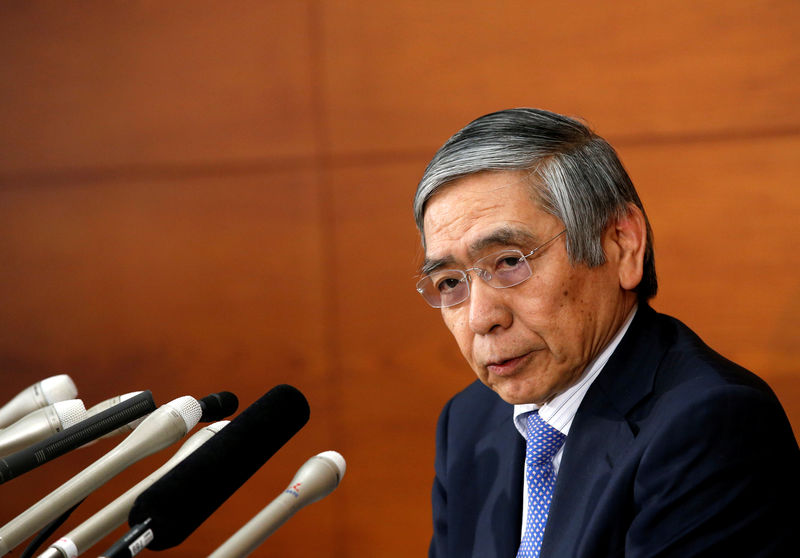By Sumio Ito and Minami Funakoshi
TOKYO (Reuters) - Bank of Japan Governor Haruhiko Kuroda said on Wednesday the central bank will consider publicising calculations on how a future withdrawal of massive monetary stimulus could affect its financial health.
The remark was the first time that Kuroda, who until now had shrugged off as premature any debate over an exit strategy for the BOJ's radical stimulus programme, has signalled the chance of offering such information to the public.
"It is very important to explain in easy-to-understand terms how monetary policy could affect the BOJ's financial health," Kuroda told parliament on Wednesday.
"We will consider it as a future possibility," he said, when asked about the chance of releasing calculations on the effect a withdrawing of stimulus could have on the BOJ's balance sheet.
Kuroda said he was not currently thinking about any specific ways to change the BOJ's present policy mix, stressing that yield curve control remained the main focus of monetary policy.
"In theory, it is possible to combine the different elements of monetary policy in several ways," Kuroda said. "However, I'm not thinking about changing the policy mix right now."
He also said the amount of government debt purchases and the monetary base level included in its policy statement were merely guidelines.
"The amount of our bond purchases may vary depending on financial market conditions at the time. But this has no implications for monetary policy going forward," Kuroda said in a speech he delivered later in the day.
DEBT BANKROLLING "UNNECESSARY"
Kuroda said economic recovery in Japan was taking hold more firmly but warned that overseas developments, such as uncertainty over U.S. economic policies, remained the biggest risks to its outlook.
"While global economic growth is gaining momentum, various uncertainties remain" that could weigh on Japanese consumer and corporate sentiment, he said in the speech.
The government and the BOJ must work together to seek an appropriate mix of fiscal and monetary policy measures to ensure the recovery is sustained, Kuroda said.
But he added it was "unnecessary and inappropriate" for the BOJ to bankroll government debt and directly finance fiscal spending, an idea proposed by some academics who call for more radical measures to reflate Japan's economy.
At its most recent meeting on April 26-27, the BOJ maintained its short-term interest rate target at minus 0.1 percent and a pledge to guide 10-year government bond yields around zero percent.
It also maintained a loose pledge at the meeting to buy government bonds at a rate that would increase its holdings by 80 trillion yen a year.
Since then, the BOJ has said it will reduce its monthly government debt purchases in May, showing the central bank is stepping back from the 80 trillion yen (543.8 billion pounds) target.
Prior to the meeting, some economists speculated that the BOJ could remove the 80 trillion yen figure from its statements because it was no longer the main lever of its policies.
